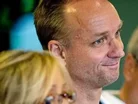The Amazing Doctor Who Delivered a Baby from a Transplanted Womb

There has been a breakthrough in health care: a woman in Sweden has given birth to a healthy baby boy after receiving a womb transplant just one short year ago.
The 36-year-old mother received a uterus from a family friend last year and gave birth to her premature, but healthy, son last month. News of the delivery was not announced until yesterday, Oct. 3, to ensure the baby’s and mother’s well being.
But who is behind the delivery, and more importantly, the transplant?
The answer to that is Dr. Mats Brannstrom, a professor of obstetrics and gynecology at the University of Gothenburg and Stockholm IVF who led the research and delivered the baby with the help of his wife.
Brannstrom previously led an initiative beginning in September 2012 to transplant wombs in ten women who were born without a uterus or had it removed because of cervical cancer. One woman, however, had to drop out of the procedure due to medical reasons, bringing the total number to nine.
In the experimental procedure that raised ethical concerns, the nine women successfully received transplanted wombs donated from relatives and ignited hope amongst women unable to have children.
While complications arose in two of the women participating in the experiment, forcing removal of the organs, earlier this year Brannstrom began transferring embryos into the seven other women, according to AP. Two pregnancies are now at least 25 weeks along.
Before these cases, there had been two attempts to transplant a womb – in Saudi Arabia and Turkey – but no live births resulted. Doctors in Britain, France, Japan and Turkey continue to try similar operations but use wombs from women who have recently died instead of from live donors.
Brannstrom has said that using live donors allowed them to ensure the donated wombs were functional and didn’t have any problems such as an HPV infection.
A Controversial Topic
The procedure raised concerns from experts about whether it was ethical to use live donors since it was not a life-saving event while others, such as bioethics expert John Harris, didn’t see a problem with the procedure, arguing the fact that kidney transplants do not save lives and are yet widely promoted.
While ethical concerns remain at bay, the procedure still remains highly unlikely to become common practice.
According to Dr. Glenn Schattman, past president of the Society for Assisted Reproductive Technologies and a Cornell University fertility specialist, the procedure “would not be done unless there were no other options,” he told AP. “It requires a very long surgery and not without risks and complications.”
A Successful Delivery
The Swedish mother received a uterus from her 61-year-old family friend. Brannstrom was initially surprised to see an aged uterus be successful but was more concerned on the health of the womb.
After one year of evaluation, Brannstrom was convinced the womb was working well and transferred a single embryo created in a lab dish using the woman’s eggs and her husband’s sperm.
The baby's growth and blood flow to the womb and umbilical cord were normal until the 31st week of pregnancy, when the mother developed a dangerous high-blood-pressure condition called preeclampsia.
After an abnormal fetal heart rate was detected, the baby was delivered by cesarean section. He weighed 3.9 pounds — normal for that stage of pregnancy. The baby was released from the neonatal unit 10 days after birth.
“He's no different from any other child, but he will have a good story to tell,” the father said. “One day he can look at the newspaper articles about how he was born and know that he was the first in the world to be born this way.”
Details of the case are to be published in the journal Lancet.
- Healthcare providers: The route to digital transformation successTechnology & AI
- Stryker appoints a new head for its India operationsTechnology & AI
- Baylor Scott & White Health and Memorial Hermann Health System are set to mergeDigital Healthcare
- Pfizer’s announces new CEOTeleHealth & COVID-19



